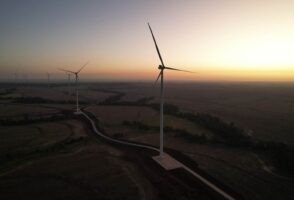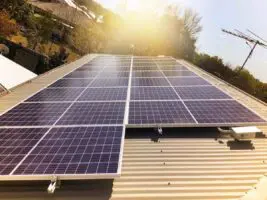The Australian Greens are again eyeing the balance of power in federal parliament, as party leader Adam Bandt marks the tenth anniversary of the passage of the carbon price mechanism by saying Australia could have been a climate leader had the policy remained in place.
Bandt will tell a Greens Institute event on Monday evening that had the carbon price mechanism remained in place, Australia could have achieve the Morrison government’s 2030 target a decade earlier than currently planned.
The Clean Energy Future Package was passed by the Gillard government in 2011, with support from a crossbench made up of independents and the Greens, and included the now-repealed carbon price, labelled a tax by the then Coalition opposition, and allocated billions for investment in clean energy technologies.
The package included the creation of the Australian Renewable Energy Agency, the Clean Energy Finance Corporation and the Climate Change Authority – agencies that all managed to survive attempts by the Coalition to dismantle them. They have proven crucial to Australia’s progress on increasing renewable energy uptake.
Bandt will argue that the carbon price was one of Australia’s most successful policies for emissions reduction. In the two years it was in place, Australia’s emissions fell by around 25 million tonnes, or 4.4 per cent, while the Australian economy continued to grow.
Modelling produced by The Greens suggests that with the carbon price, Australia would have achieved a 26 per cent cut to national emissions by 2020 – 10 years earlier than the Morrison government’s current 2030 target.
It also found that an extra 256 million tonnes of greenhouse gas emissions had been released over the six years between 2014 and 2020 as a result of the carbon price’s repeal.
“If we had kept the price on pollution, we would have met the Coalition’s weak 2030 targets in 2020,” Bandt will tell the Greens Institute on Monday evening. “We would be 10 years ahead of where we are now.
“Australia’s pollution would already be 26% below 2005 levels, meeting the government’s insufficient 2030 target ten years early. We would be ten years ahead of where we are now.”
“We would not be putting Pacific Islands at risk of going under. We would be able to honestly and credibly say we are doing a fair share of what needs to be done to keep people safe. We would be able to stand with our allies, the USA and the UK, to increase our 2030 commitments.”
The Abbott government repealed the carbon price mechanism in 2014 after ousting the Labor government with a scare campaign around the cost of the “carbon tax” – a campaign that has effectively made emissions pricing politically untenable.
Now, neither the Coalition nor Labor will propose a price on carbon, despite similar schemes operating successfully overseas, and despite Australian business groups – including the Business Council of Australia – calling for one after recognising it as an efficient way to account for the costs of emissions.
With the next federal election in mind, Bandt said the Greens would again aim to secure the balance of power in federal parliament, something the party sees as a key way to secure stronger climate policies at a national level.
“If history and current polling are a guide, the Greens could hold the balance of power in the Lower House and the Senate too,” Bandt will say.
“Indeed, pushing Scott Morrison into minority parliament will only take a few hundred people shifting their votes, but Labor needs to defy recent history to win a majority in their own right. So a power-sharing parliament is the most likely outcome.
“In balance of power, the Greens will kick the Liberals out and push the next government to take climate action. What we can push the next government to adopt remains to be seen. Pushing Labor to act on coal and gas will be a priority for us.”
Labor climate and energy spokesperson Chris Bowen told the ABC’s Insiders program on Sunday that the opposition party would not support the introduction of a carbon price under any future Labor government.
“If you’re asking if there’ll be an emissions trading scheme or a carbon price under a Labor Government? No,” Bowen said.
However, Bowen hinted that Labor would consider expanding the Safeguard Mechanism, a policy introduced by the Abbott government that could serve as an effective “baseline and credit” trading scheme, but currently is largely ineffectual due to the soft caps imposed on industrial emitters.










